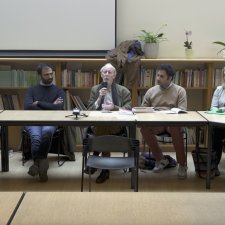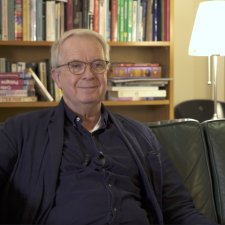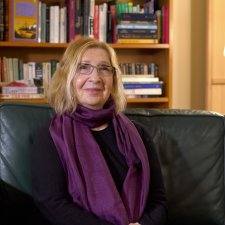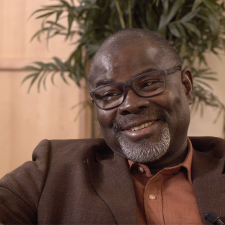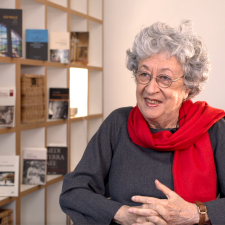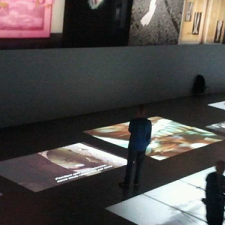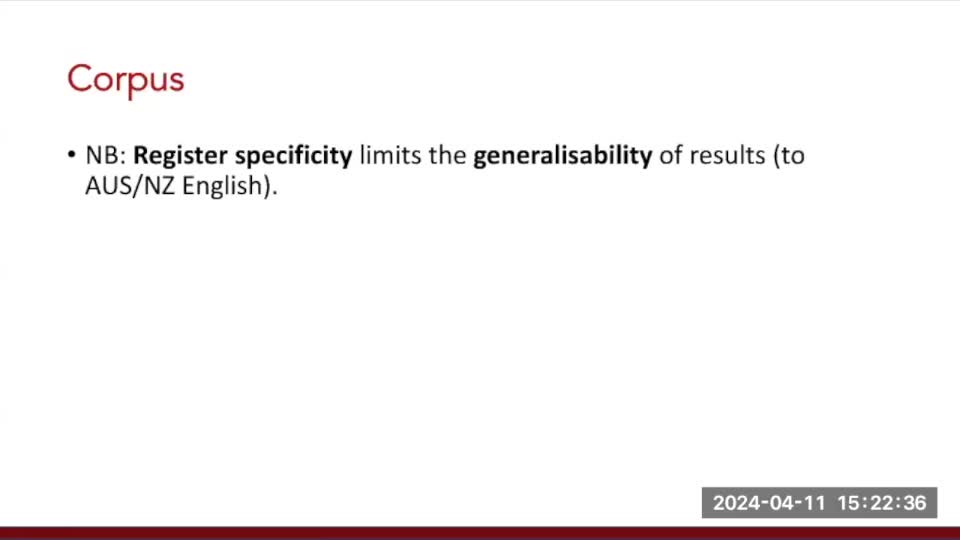Chapitres
- Bruce Curtis04'14"
- Cate Curtis04'52"
Notice
Bruce and Cate talk about la Maison Suger
- document 1 document 2 document 3
- niveau 1 niveau 2 niveau 3
Descriptif
Bruce and Cate Curtis talk about their stay at la Maison Suger.
The transcript is available in "Documentation"
Thème
Documentation
Transcript
My name is Bruce Curtis, and I'm a professor of sociology at the University of Waikato. I've been six weeks now here at the Foundation, and I've had a remarkable time. I sought out coming here because I'm interested in studying the relationship between humans and non-humans. Non-humans being mainly plants and animals. In sociological terms, we would call that the relationship between human actants and non-human actants. The home for that sort of approach is here in Paris. About 25 years ago, some French academics, Bruno Latour, Michel Callon, (Michael Laws), wrote some remarkably interesting pieces of research about imagining the world, not necessarily from the perspective of humans but, in part, insofar as you can from the perspective of non-human actants or non-human actors. So, I was very interested in coming to the home of this sort of theory in Paris, and I discovered that there was a research cluster called Habiletés. They were studying exactly the sort of stuff that I'm looking at, more from a geographical perspective and looking at urban studies. They're an inter-university organisation based at Sciences Po. Would that be it? And the Cité Université, plus some other research associations outside France. That organisation is called the Centre for Earth Sciences. So I discovered them, and I discovered that during the time that Kate and I would be here - we're here on research and study leave from our university - that they were actually running a special symposium on this Habiletés notion. Professor Nathalie Blanc has developed the material that these very famous scholars 20 years ago developed and has developed something called the new materialism, and that just seemed to be too good an opportunity to miss. So I thought, where can I possibly stay in Paris to get to go and engage with these people? Because they had a three-day symposium. I just searched the Internet for academic residences in Paris, and you popped up, bing bang bong, immediately, which was really great. I've had six of the most amazing weeks of my life being based in Paris. I've managed to attend, meet with the people five times and go to a three-day symposium; very rewarding, I mean really, really exciting. The presentations were in a combination of English, German and French, so it was very open and inclusive for everybody, so I managed to get a really great value out of that. There isn't an equivalent to New Zealand to sitting in a building like this surrounded by so much culture and so much history, and it just puts you in the frame of mind of wanting to write and wanting to do something special and dramatic. I hope to go back to my university at Waikato because we are a small university, and New Zealand is a long, long way away. In fact, my university is looking to make connections both with the Centre for Earth Sciences, and I hope to be able to put some people in contact there and also for the foundation here. I think that other academics at my university would be really, really interested in coming here and having the same experience. We would very much like to support this organisation. This is a great place to be. It's just that combination of so much history, so much culture, the chance of meeting academics who are doing your research because Paris is a powerhouse of social science research. It is just a powerhouse of research. And then there's also serendipity; there are other things going on here that you didn't plan and weren't aware of, and you'd have a serendipitous moment, and then some really interesting stuff can come out of that as well.
My name is Kate Curtis. I teach social psychology at the University of Waikato in New Zealand. My time here at Maison Suger has perhaps been a little bit more wide-ranging in a way than Bruce's. My main area of research is on self-harming behaviour in young people. As a social psychologist, I was fortunate to come with Bruce when he initially went to Sciences Po. We had a very nice conversation and wide-ranging conversation there about social issues and how they impact different people in different ways. One area of overlap that we talked about just a little bit was that in New Zealand, and I believe also in France, there is a particular issue with people who live in rural communities, particularly farmers, engaging in self-harming behaviours. Bruce mentioned serendipity just before. As it happens, there is somebody based in Paris who is doing research exactly in that area. If I wasn't here in Paris, I would never have had that opportunity to become aware of that person and follow them up and have some discussions. So my research perhaps hasn't been as directly connected into being in Paris as Bruce's has but, on a broad level, it's wonderful to just walk down the street and see an avenue named after a famous researcher. It is very inspiring on a very kind of subtle level to be in a place which has this history of scholarship, of supporting the sciences, and to come to Maison Suger and to feel so supported as well. For me, the six weeks we've been here have also been a great opportunity because of the centrality of Paris to travel to other places. So while we've been here, I've been to a conference in Edinburgh, I've been to a conference in Glasgow, and just last week, I went to a conference in Vienna. So it's very easy, because of that centrality, to go to other places. I think Maison Suger also has great facilities. I have spent some time downstairs in one of the workspaces there because, although there is a workspace in the rooms, I have students that I'm supervising back home in New Zealand, so I've had to make Zoom calls and that kind of thing. So it's been very easy to arrange, knowing that there's a quiet space where I can go that I'm not disturbing anybody, that I can sit and talk to the students that I'm supervising and still have that undisturbed communication with them even though we're on the other side of the world. We mentioned earlier serendipity and just chance meetings with people. Quite some years ago, Bruce and I wrote an article about suicidal behaviour in New Zealand, which was linked to the socio-economic situation, and I mentioned a moment ago about how we have very high rates of suicidal behaviour in rural areas. We wrote this article quite some years ago, and it had drifted to the backs of our minds, I think it's fair to say. But again, coming across this person who's doing research here in that area has got us thinking, "Oh, we should follow up on that again, see what the statistics look like now." So again, it's that idea of those chance meetings, those chance conversations that spark ideas that you wouldn't have, particularly in New Zealand because it's such a sparsely populated country. You don't have those same engagements that you have here, those same chance meetings, because there simply isn't the number of people to have those chance meetings with. So going to those symposiums, conferences, etc., and meeting those like-minded people, these days, at least at home in New Zealand, we hear a lot about, "Oh, we've got Zoom; you don't need to go overseas to conferences, it costs a lot of money, it's bad for the environment." Of course, those things are true, but for me, being here has again reinforced how important it is to have those face-to-face conversations. Yes, you can Zoom into a conference and hear the presentation, but it's having the conversations, you have a cup of coffee, and you see that person. You say, "I was really interested in your presentation. Have you thought about such and such?" And you have that conversation. That's just so important, so important. Zoom has its place, but there's nothing like being in person.
Dans la même collection
-
Table ronde : Nehru. Les débats qui ont fait l'Inde
HussainAdeelSinghTripurdamanRacineJean-LucBlarelNicolasEleftheriadisPavlosVijay SinghViguierAnneXifarasMikhaïlÀ l’occasion de la sortie de l’ouvrage Nehru. Les débats qui ont fait l’Inde aux Éditions de la MSH, la FMSH a organisé une table ronde à la Maison Suger en présence des auteurs et de spécialistes
-
Knut Eliassen talks about Maison Suger
EliassenKnut OveKnut Eliassen talks about his stay at Maison Suger
-
Monique Yaari nous parle de la Maison Suger
YaariMoniqueMonique Yaari nous parle de son séjour à la Maison Suger
-
Bony Guiblehon nous parle de la Maison Suger
GuiblehonBonyBony Guiblehon nous parle de la Maison Suger et le lien avec ses recherches.
-
En résidence à la Maison Suger : Scarlett Marton
MartonScarlettScarlett Marton nous parle de son séjour à la Maison Suger Sous-titres et transcription disponibles en français et en anglais.
-
Sur le même thème
-
"Double modal constructions in Australian and New Zealand English: A computational sociolinguistic …
MorinCameronIn this presentation, I report the first large-scale corpus study of double modal usage in Australian and New Zealand Englishes, based on a multi-million-word corpus of geolocated automatic speech


